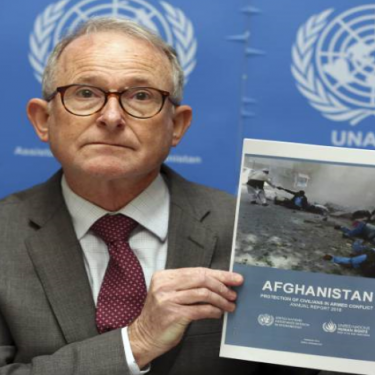Act quickly to protect Afghan journalists, RSF tells new UN special rapporteur

Reporters Without Borders (RSF) wrote today to Richard Bennett, the UN’s new special rapporteur on the human rights situation in Afghanistan, calling for urgent action to defend journalists and press freedom in Afghanistan, where arbitrary arrests are on the rise and a climate of fear has taken hold in all media outlets.
The appointment of Bennett, an academic with British and New Zealand dual nationality, was announced by the UN Human Rights Council on 27 March.
RSF’s letter draws Bennett’s attention to the fact that – despite a claim by government spokesman and deputy information and culture minister Zabihullah Mujahid in February that the March 2015 the media law is still in effect – the press freedom situation has worsened dramatically, that journalists are being arrested arbitrarily and that new restrictions have been imposed on them and media outlets.
The new restrictions include an information and culture ministry decree on 28 March banning privately-owned TV channels from retransmitting news programmes provided by international broadcasters – BBC, Voice of America and Deutsche Welle – in local languages (Dari, Pashto and Uzbek). When contacted by RSF, a ministry spokesman blamed the ban on “the problem of the attire worn by these media’s women presenters, after several warnings.”
The harassment of journalists has intensified as a result of the new restrictions, especially since the start of 2022, causing widespread alarm within the media. Threats and arbitrary arrests have increased and officials with the various security services, especially the intelligence services (Istikhbarat) can now ban broadcasts and programmes and can go directly to media outlets to arrest journalists or other employees.
At least 50 media workers were arrested by the Afghan police and intelligence services from 15 August 2021 (the date of Kabul’s fall to the Taliban) and 4 February 2022.
“As the regime continues to arrest journalists and step up pressure on the media, the press freedom situation in Afghanistan must not pass under the radar of the international community’s attention,” said RSF advocacy and assistance director Antoine Bernard. “From the new UN special rapporteur on Afghanistan, Richard Bennett, we expect the maximum possible involvement in support of free, pluralist and independent journalism.”
Raids, arrests and a disappearance
During a raid on four local radio stations – Melat Ghaz, Tabasom, Sangheh and Zama – in the southern city of Kandahar on 28 March, Istikhbarat agents arrested journalists Farid Alizi, Mahmoud Mehraban, Agha Shir Manar, Rahim Mehraban, Samioulah Wahdat and Vares Nouri for allegedly violating a Taliban ban on broadcasting music, and proceeded to hold them for at least 24 hours.
The next day, Melat Ghaz director Besmollah Vatandoste went to demand their release and to give his radio station’s undertaking to respect the ban, but he was also arrested and, without any basis, was accused of having links with resistance groups in Afghanistan and with the Pashtun movement in Pakistan. He was eventually released nine days later.
The family of Khalid Qaderi, a researcher and journalist with Radio Norroz in the western city of Herat, has learned nothing about his fate since his arrest by Taliban intelligence agents on 17 March. The authorities said nothing in response to the news of his arrest, announced in a tweet by his sister, a lawyer who defends the human rights of exiles.
Khpolwak Sapai, the head of the Tolo News TV channel, Bahram Aman, a journalist who is one of its presenters, and a media lawyer were arbitrarily arrested by armed intelligence agents at Tolo News headquarters in Kabul on 17 March for reporting that restrictions were being placed on the broadcasting of foreign TV series. Sapai and the lawyer were released a few hours later, after a heavy-handed interrogation, but Aman was held for almost 24 hours.
RSF stresses the arbitrary nature of these arrests to the special rapporteur. Under the March 2015 press law, which is still officially in effect, the Istikhbarat do not have the right to intervene directly in media matters or to detain journalists before the Media Offences Verification Commission has issued an assessment. Although promised by the authorities, this commission has yet to be created. Its creation has repeatedly been requested by Afghanistan’s journalists.
Afghanistan is ranked 122nd out of 180 countries in the World Press Freedom Index that RSF published in April 2021.



